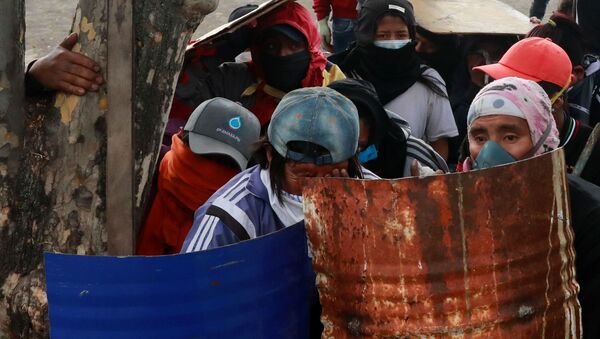According to Irene León, Ecuadorian sociologist and member of the Network of Intellectuals in Defence of Humanity (la Red de Intelectuales en Defensa de la Humanidad), Ecuadorian Government's IMF is part of a plan developed since Lenin Moreno took office in 2017.
The Ecuadorian Constitution contemplates a debt ceiling and several requirements to establish relations with external organisations.
"It was necessary to meet the conditions for the IMF to consider us; we sought a loan when the country could've solved its economic problems in another way," she stated.
While the IMF agreement was part of the "neo-liberal Reconquista" from the beginning; the decision to terminate it in October was in response to IMF demands.
"The elites are very arrogant; they are more in-tune to financial capital, export companies and the dynamics of global capital than to Latin American dynamics."
Moreno retains the support of some lobbies, "the elites and the Army," the Ecuadorian sociologist pointed out. But his popularity is very low and is decreasing with time. "He's had less than 10% support in the polls," she said.
In addition to overestimating itself, the Government made another mistake- that of underestimating the response.
"They didn't think there was a capacity for mobilisation like the one expressed, and they didn't think that rural and indigenous peoples would uprise," she added.
León pointed out several mobilising factors:
- "The people engaged in the process of the citizen's Revolution- the political process that was led by former President Rafael Correa, which has some central characteristics, such as a "mentality of resistance to neoliberalism," did not necessarily have an organisational space.
- The trade union movement is one of the most powerful. They were one of the first to reject the package of economic measures, in particular, the removal of the gasoline subsidy, which affects the price of fuels, and therefore the cost of transport and merchandise.
- Participation by Women and youth.
- The Confederation of Indigenous Organisations of Ecuador (La Confederación de Nacionalidades Indígenas del Ecuador (CONAIE)), has played a crucial role in the agenda this week.
CONAIE said that they wouldn't engage in dialogue until Moreno didn't back down from the package of measures requested by the IMF. In turn, the President refused to do so. How long can this struggle last?
“This situation can no longer last, there has to be an outcome,” León concluded.



